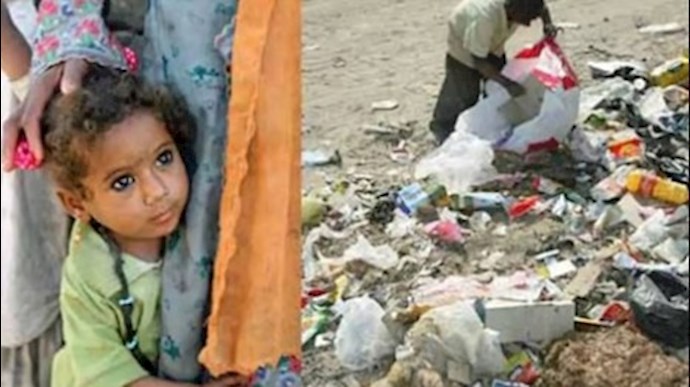Analysis by PMOI/MEK
Iran, June 23, 2021—Months before the regime’s sham presidential election, held on June 18, it was clear that Iranian regime supreme leader Ali Khamenei was seeking to solidify his hold on power by making Ebrahim Raisi, a notorious mass executioner, the next president of the regime.
But aside from anything Khamenei gains from appointing one of his close allies (and possibly his successor) as the president, there are fundamental problems that remain unsolved. A large portion of the Iranian population is struggling to provide their most basic needs, and the regime’s corrupt structure is incapable of solving these problems. The regime’s executioner president must now face the poor and hungry, the unemployed masses, the underpaid workers, the outraged farmers, teachers, students, and retirees.
Therefore, it’s no surprise that, in its June 19 editorial, the state-run Sharq newspaper wrote: “Although a clear economic plan has not yet been drawn up, the government has to fix the economic gaps quickly. Otherwise, the government will be in turmoil. This turmoil will make the government more and more dependent on the support of its loyalist base. And this dependence will to antagonism between government loyalists and the underprivileged segments of the society. And anything that is hard and inflexible will soon be broken.”
The so-called reformist camp is also warning that if Raisi does not start correcting the methods and programs of the economy, there is no hope of survival.
Jahan-e Sanat daily wrote on June 19: “Looking at the very chaotic economic situation in the country that everybody agrees on, we must say that the main challenge for the 13th government is the rising inflation rate, the main starting point of which was a 300 percent increase in the price of gasoline and other oil products in 2019 that led to a major social crisis, a crisis whose negative consequences are still evident in various ways and continue to remain a thorn in the side of the government.”
These types of warnings are usually followed by a list of challenges that cover all aspects of Iran’s economy. Per Jahan-e Sanat: “Unprecedented hyperinflation in the recent 50-year history of the country, the total sum of which has exceeded 200 percent in the four years of the second term of Rouhani’s presidency… astronomical and devastating increase in the cost of living for the majority of the population and even the middle class… Increase in poverty and the deepening of the economic divide… a sharp increase in the cost of production… unprecedented drop in economic growth and near-zero investment growth… increase in unemployment rate… rate of capital flight from the country… growth of liquidity… sharp and unprecedented of national currency depreciation… outbreak of Covid-19 and heavy financial losses in the last two years… unfortunately, none of the presidential candidates, including the winner of the election, presented any plan to find a way out of these super-challenges.
“There are structural and infrastructural problems… the economy is closed… it will not be reformed at all with the coming and going of individual… extremists who benefit with internal crises do not allow calm to return to the country’s economy… they make big money by circumventing sanctions… many of these people, knowingly or unknowingly, are dragging the country into chaos.”
The conditions of the oil industry
According to a June 5 report by the state-run Fars News Agency, Alireza Daneshi, former technical director of the National Company for the South Oilfields and a member of the oil committee of Raisi’s campaign, described the conditions of the oil industry as such: “The gas company, with its many facilities and planning and targeting, could not achieve effective revenue generation in the gas industry. The situation of the National Refining and Distribution Company is the same as the National Gas Company, and in fact these two companies now need financial assistance. In the petrochemical industry, due to unbalanced development and lack of attention to all value chains, only upstream products have been produced, about 50 percent of which is Methanol. In other words, the lack of rational policy-making and governance in this industry has caused the petrochemical industry’s share of profs to be set at a minimum. The National Iranian Oil Company is the only direct profitable sector of the Ministry of Oil that can finance all parts of the Ministry and provide a significant share of the country’s budget. But due to mismanagement, the company has not been able to meet its needs based on economic science. Therefore, to maintain the production and development of hydrocarbon fields, the Oil Company has resorted to bad practices such as bonds and dangerous loans.”
Empty tables for the people
The gap between rich and poor is wider than ever. This gap also affects people’s lives, further dividing society and making the struggle for survival harder and harder. Of course, in such conditions, women and children suffer more than others.
Terrible inflation makes people poor every day. Over the past year, the price of 30 major household items has grown by an average of 80 percent.
According to a June 19 report by the Eghtesad-e Pooya daily, among these 30 items, poultry was at the top of the list with a 140-percent price increase. And the second to tenth highest prices increases belong to vegetable oil (137%), imported rice (132%), butter (112%), eggs (106%), chickpeas (105%), lentils (99%), domestic oranges and cotyledons (93% each).
These statistics with loss of jobs and the Covid-19 pandemic and the repression of the people are further proof of the rampant corruption in the regime, which will not change with a shuffle of the political lineup.





